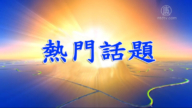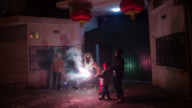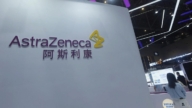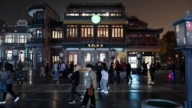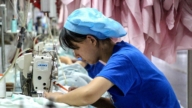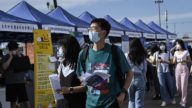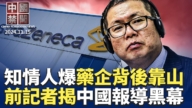【新唐人2014年03月27日訊】台灣「反服貿學運」還在延燒,總統馬英九再次同意學生們提出的對話要求。連日來,海峽對岸的中共官方媒體,也發表大量文章報導台灣學運,隔空參戰。近在咫尺的台灣學運,對北京當局來說,恐怕也無法掉以輕心。
台灣的中華民國總統馬英九26號再次表示,願意邀請「反服貿」學生代表到總統府對話,並且同意學生的要求,在公開透明的場合見面,並全程開放,讓媒體採訪。
從18號開始,台灣學生發起「反服貿」抗議後,大陸媒體的報導耐人尋味。這些報導有的評價台灣學生恐懼開放,缺少雄心和勇氣﹔有的說台灣民進黨是學運的幕後指使者,還有媒體公然引用中共前領導人的說法,要用經濟合作「買」下台灣。
原《中國》雜誌社記者劉逸明:「大陸的媒體在做新聞報導的時候,往往首先考慮的是是否在政治上正確,報導要符合中共當局的口味。台灣的反服貿,中共官方肯定是非常害怕的。因為反服貿的核心就是反對台灣甚麼都依賴大陸,這個時候中共就完全可以控制台灣。」
台灣「反服貿」學生抗議馬英九政府以「黑箱作業」方式,同北京當局簽署這項協議。但25號,中共官媒《央視》國際臺採訪了台灣爭議人物,前立委邱毅。他說,學生佔領的立法院講臺上的太陽花,是香蕉,並振振有詞的確認說,那些「香蕉」是民進黨人送給學生的,是民進黨指使學生發起這場運動,邱毅的說詞現在已招來一片嘲諷。
中國民主黨成員周志榮:「 中國政府的媒體他們報導所有的國際事件,首先的出發點是要維護他們的獨裁政權。如果他們在報導的時候有可能引發多米諾骨牌效應,導致他們獨裁政權垮臺,他們都有一個迴避。包括香港的民主運動,烏克蘭與俄羅斯的紛爭問題,他們統一都是這樣。」
21號,大陸《環球網》發表文章說﹕「北京不發一槍『買下』台灣。文章引述前中共領導人的話表示,通過『買』而非武力統一台灣,更容易,經濟代價也更小。所以,北京一直按此邏輯行事。」
文章還說﹕「在經濟上,大陸試圖通過服貿協定推動兩岸融合。從北京的觀點看,這個協定意在發揮一種至關重要的政治和統戰作用。」
《環球網》的這篇文章翻譯自《美國世界論壇網》2月19號發表的評論文章,原標題為「北京『買下』台灣的戰略:不發一槍裹挾統一」。文章說﹕「確實,北京對臺戰略變化幅度之大、之快,出乎台灣和海外觀察人士意料。」
劉逸明:「這也是中共這麼多年以來摸索出來的一條新路子。比如香港,本來香港應該實施一國兩制的,做為政治特區。但是這些年香港越來越被大陸所同化,實際上現在的香港完全在中共的掌控之中。如果台灣像香港這樣,會終有一天被中共實際掌控。」
香港《太陽報》日前評論指出,這場學運雖然在台灣立法院燃燒,但現在最緊張的恐怕是北京當局。文章說:「如今內地局勢相當嚴峻,貧富分化、官民對立、左右衝突、城鄉差別、強拆強佔等引發的群體性事件此起彼伏,中南海猶如坐在火藥桶旁邊。如果台灣學運外溢到內地,勢將引爆整個火藥桶。」
文章作者分析:「從歷史看,民主運動的外溢效應相當明顯,無論當年東歐、蘇聯的變天,還是中東、北非地區阿拉伯之春運動,莫不如此。」
周志榮:「他們(北京當局)是很危險,他們自己的警惕性也非常之高。中國的老百姓一效仿,他們就是完蛋!只要一上街,他們知道就完蛋了。所以他們現在就是用盡一切辦法控制,防人民如防洪水猛獸,已經是達到這個程度,已經是末代王朝的徵象。」
中共官媒25號也發表署名評論文章,宣稱「大陸決不能與台灣重啟服貿談判」。外界認為這是對臺施加壓力。有學者指出,「反服貿協議」對台灣已經是生死攸關的大事。
採訪編輯/唐音 後製/孫寧
Chinese Communist Pary Media War on Taiwan Student Movement
The Taiwanese student protest movement
against it’s governments trade pact continues.
President Ma Ying-jeou has once again
agreed to students’ requests for dialogue.
China’s state-run media has also recognised the
movement with numerous articles and reports.
Taiwan’s students movement is unlikely to be an easy
topic for the Chinese Communist Party (CCP) to address.
On March 26, President Ma Ying-jeou again
expressed his willingness to invite student
representatives to the Presidential Building.
This meeting would be to conduct an open and
transparent dialogue in the presence of the media.
Since Taiwanese students launched a protest
against the govermnents trade pact, CCP
state run media reports have been intriguing.
Some suggest the Democratic Progressive
Party (DDP) as behind the student movement.
Other openly refer to former CCP leader’s quote,
in buying Taiwan with economic cooperation.
Liu Yiming, former reporter, China Magazine:
“The first priority for the Chinese state media is about
politically correct reporting, to meet the CCP’s demand.
Taiwanese student protests against the
trade pact will surely be frightening the CCP.
The protests are standing against total reliance on China,
which would otherwise allow the CCP to control Taiwan."
Taiwanese students initiated the protests in objection
to the ‘black box’ approach that their government
undertook in signing the agreement with the CCP.
China’s state-controlled CCTV interviewed a
controversial Taiwanese figure; former legislator Chiu Yi.
Chiu Yi said that the sunflowers at the podium of the
Legislative Yuan, along with the students, were bananas.
He also claims those bananas were from the opposition
party, the Democratic Progressive Party (DPP), and
it is the DPP that has instructed the student protest.
Chiu Yi’s word have attracted criticized.
Zhou Zhirong, China’s Democracy Party member:
“The CCP media coverage of international
events are to ensure it’s dictatorship is not shaken.
If anything could trigger a domino effect
leading to the collapse of it’s authoritarian
regime, they will avoid reporting it.
As an example, all reports were unified about
the democracy movements in Hong Kong
and disputes between Ukraine and Russia."
On February 21, state-controlled huanqiu.com published
an article titled, “Beijing buys Taiwan without firing a bullet".
This quoted a former leader that, “it is both easier and
less expensive to ‘buy’ than to militarily conquer Taiwan.
Hence, Beijing has been steadily acting on this logic."
The article also confirms that, “through economic means,
the pact serves as a political and united front operation".
This Chinese article was originally a commentary on
WorldTribune.com entitled, “Beijing’s strategy to ‘buy’
Taiwan: Coerced unification without firing a shot."
The article stated that, “indeed, Beijing’s approach
toward Taiwan has changed so much and so
quickly, that it seems to be catching observers
in both Taiwan and abroad dangerously off-guard."
Liu Yiming: “This is the new strategy the
CCP has developed after so many years.
Hong Kong was supposedly meant to be a Special
Administrative Region with ‘one country, two systems’.
However, after being returned to China,
Hong Kong has been assimilated to the mainland.
It is coming under control by the CCP.
If Taiwan allows the CCP to treat Taiwan like it has
treated Hong Kong, the CCP will eventually control Taiwan."
Hong Kong’s The Sun newspaper recently commented
that Beijing authorities are likely to be under great pressure
over the student movement in Taiwan’s Legislative Yuan.
“The current mainland situation is quite grim
with the division of rich and the poor growing.
There are problems with citizens and officials, from the
left or the right, with urban or rural problems, and mass
protests triggered by forced demolition and land grabbing.
Zhongnanhai is like sitting next to a powder keg.
The spread of Taiwan’s student movement
could detonate the entire powder keg."
The article further analyzed that, “historically, the spillover
effects of the democratic movement have been obvious.
From the collapse of the Communist Party in Eastern
Europe to the Soviet Union, and the Arab Spring
movement in the Middle East and North Africa.
They are all examples."
Zhou Zhirong: “The Beijing authorities are
in danger, and they are also on high alert.
Once the Chinese people follow these sorts of actions,
and once they take to the streets, the regime is finished.
That’s why they have tried everything
to defend it like defending the scourge.
The symptoms of the end of a ruling party are showing."
CCP state-run media also published
a signed commentary on the March 25.
It declared that “the mainland must not restart
any trade pact negotiations with Taiwan".
The article was critical, and further pressured Taiwan.
Some scholars have warned that protests against the
trade pact are a matter of life and death for Taiwan.
Interview & Edit/Tang Yin Post-Production/Sun Ning


